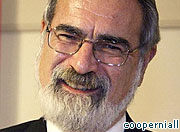The Chief Rabbi, Lord Sacks, has broken his silence and made known his opposition to Government plans to change the meaning of marriage.
It follows a strong response to the proposals by the Church of England, the Roman Catholic Church, and Muslim groups.
A carefully worded submission to the Home Office consultation states that same-sex unions are “against Jewish law”.
Definition
The submission was made in the name of the London Beth Din (the Chief Rabbi’s court) and the Rabbinical Council of the United Synagogue.
The Chief Rabbi’s Office confirmed with the Jewish Chronicle that Lord Sacks supports the submission.
The submission states: “Marriage, by definition in Jewish (biblical) law is the union of a male and a female.
Same-sex
“While Judaism teaches respect for others and condemns all types of discrimination, we oppose a change to the definition of marriage that includes same-sex relationships. Jewish (biblical) law prohibits the practice of homosexuality.”
Civil marriage for same-sex couples should be rejected because, they said, “any attempt to redefine this sacred institution would be to undermine the concept of marriage”.
They also voiced concern that the European Court of Human Rights could be used to challenge “any attempt to exclude the possibility of a religious ceremony” for same-sex couples.
Prohibits
And they made clear that Orthodox Judaism “prohibits same-sex civil partnerships”.
Last week, the Church of England warned that the plans to redefine marriage would alter the meaning of marriage for everyone.
It also warned that the plans would plunge churches into legal chaos, and undermine the links between church and state – sparking a potential constitutional crisis.
Petition
The Coalition for Marriage has been leading the campaign to keep marriage between one man and one woman.
The group has collected nearly 600,000 names on a petition. The first half-million names were handed in to Downing Street last week.
The issue has also caused deep unease within the Tory party, and the Prime Minister has been forced to allow a free vote to stave off a rebellion.
Four Government ministers have voiced concerns about the policy, believing it is unpopular with voters who would rather see the Government doing something to revive the economy.

